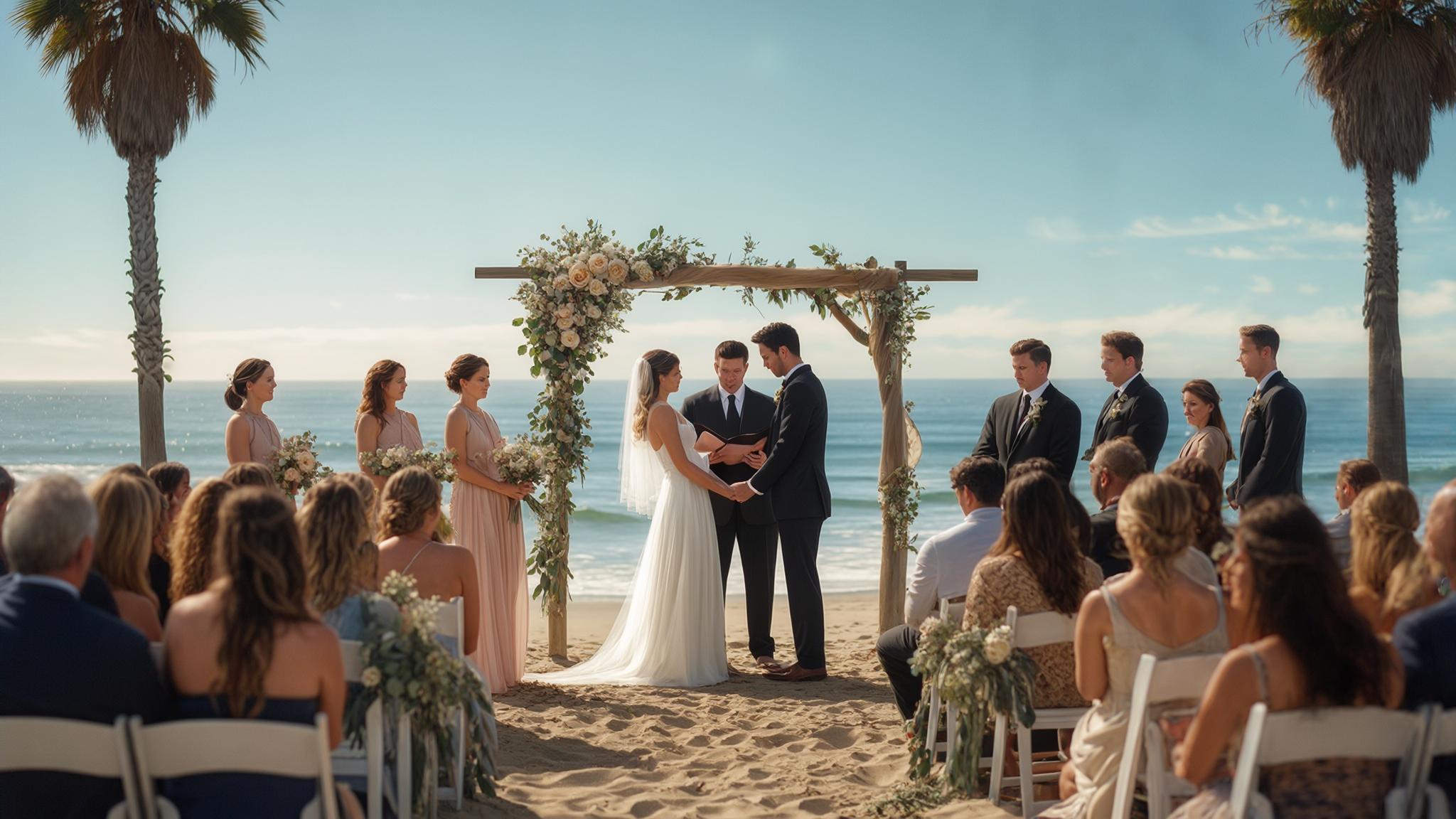Hi, Friend! Jen Glantz here. I’m a bestselling author, the first ever bridesmaid for hire and have been hired by hundreds of brides all over the world. Let’s talk about california marriage laws.
California’s marriage laws have evolved significantly, with same-sex marriage becoming fully legal after the U.S. Supreme Court overturned Proposition 8. According to FindLaw, California recognizes civil marriages between all couples while requiring both parties to freely consent and have the legal capacity to marry. I remember when my cousin planned her wedding in California – she was shocked to discover how many specific legal requirements existed beyond just showing up with rings and good intentions. Understanding these 25 essential laws will help you navigate California’s marriage system successfully and avoid costly legal complications.
Stay legally organized with our Wedding Planning Tool
California’s marriage recognition system includes civil marriages for all couples, domestic partnerships with state-level rights, and acknowledgment of valid out-of-state common law marriages despite not recognizing new common law unions within the state. Legal capacity requirements mandate that both parties must be of sound mind and understand their marriage responsibilities, with mental illness not automatically disqualifying someone if they comprehend their obligations.
TL;DR
- You must be 18 or older to marry in California without exceptions for minors as of 2019
- Marriage licenses cost $35-$100 depending on your county and remain valid for exactly 90 days
- California operates under community property laws, meaning most assets and debts acquired during marriage become jointly owned
- No waiting period exists between getting your license and having your ceremony
- You need one witness over 18 and an authorized officiant, though self-uniting marriages are also permitted
- Your completed marriage certificate must be filed within 10 days of your ceremony
- Same-sex marriages receive full legal recognition with identical rights to opposite-sex unions
Quick Resources:
-
Map out every legal step with our Wedding Planning Tool
- Our #1 Free Elopement Planning Tools
-
Craft the perfect ceremony with our Interactive Vow Writing Tool
-
Explore all Wedding Tools
Understanding California’s Marriage Law Framework
California’s marriage law system establishes five critical areas you need to consider before getting married: legal eligibility requirements including age and relationship restrictions, documentation and procedural requirements for licenses and ceremonies, financial implications through community property laws, residency and venue flexibility, and timeline factors including license validity periods. These considerations work together to create a comprehensive legal framework that affects every aspect of your marriage from the ceremony through your daily married life.
The framework prioritizes legal eligibility through age restrictions, mental capacity requirements, and prohibited relationship definitions while ensuring proper documentation through licensing, identification, and witness requirements. Financial and procedural elements intersect through community property laws, prenuptial agreement validity, timeline management for license validity periods, and venue flexibility that accommodates various ceremony preferences.
Understanding these legal requirements is just one part of planning your dream wedding, which involves coordinating multiple moving parts to ensure your special day goes smoothly.
Plan your entire day seamlessly using our Wedding Planning Tool
| Marriage Law Category | Key Requirements | Timeline Considerations |
|---|---|---|
| Legal Eligibility | 18+ years old, mental capacity, no prohibited relationships | Must verify before license application |
| Documentation | Valid ID, marriage license, witness signatures | License valid 90 days, certificate filed within 10 days |
| Financial Laws | Community property system, debt responsibility | Affects entire marriage duration |
| Ceremony Rules | Authorized officiant or self-uniting option | No waiting period after license |
| Recognition Standards | Full legal recognition for all valid marriages | Immediate nationwide recognition |
Essential Legal Requirements for Getting Married
1. Minimum Age Requirement
California requires both parties to be at least 18 years old to marry, with absolutely no exceptions for underage marriage since 2019. This law eliminated all previous provisions that allowed minors to marry with parental consent or court approval, making California one of the strictest states regarding marriage age requirements.
The 2019 legislative change removed all pathways for minors to marry, including previous exceptions for parental consent, court orders, pregnancy, or emancipated minor status. This absolute age requirement applies regardless of circumstances, cultural traditions, or consent from parents, guardians, or courts.
Consider Sarah and Michael, both 17 years old, who want to marry before Michael deploys with the military. Despite having parental consent, military necessity, and court support, California law absolutely prohibits their marriage until both reach 18. They must wait until their 18th birthdays or consider marrying in another state, though they’d need to research that state’s recognition requirements carefully.
> View All Elopement Planning Tools Here
2. Mental Capacity Requirement
Both parties must possess the mental capacity to understand the nature of marriage and provide informed consent to the union. This requirement protects individuals who may be under the influence of substances, experiencing cognitive impairments, or facing coercion, ensuring that marriage decisions are made with full awareness of the legal and personal commitments involved.
Mental capacity evaluation focuses on understanding marriage responsibilities and commitments rather than general mental health status, meaning mental illness doesn’t automatically disqualify someone from marrying. The requirement protects against marriages entered under duress, substance influence, or when individuals cannot comprehend the legal and personal obligations of marriage.
3. Prohibited Relationships
California law prohibits marriages between close relatives to prevent genetic risks and maintain social boundaries. These restrictions include parent-child relationships, siblings (including half-siblings), aunt/uncle with niece/nephew relationships, and first cousins in certain circumstances, with violations potentially resulting in marriage annulment.
Prohibited relationships extend beyond immediate family to include adoptive relationships and step-relationships in many cases, recognizing both biological and legal family structures. First cousin marriages face specific restrictions based on age and reproductive capacity, with some exceptions for couples over certain ages or those unable to reproduce.
4. Previous Marriage Dissolution
Any previous marriages must be completely dissolved through divorce, annulment, or death before entering a new marriage. California strictly enforces this requirement to prevent bigamy, requiring proof of dissolution and potentially criminal charges for those who attempt to marry while still legally married to another person.
Documentation requirements include certified copies of divorce decrees, annulment orders, or death certificates, with county clerks verifying dissolution status before issuing new marriage licenses. Bigamy charges can result in felony convictions, making proper dissolution verification crucial for both legal compliance and avoiding serious criminal consequences.
5. Same-Sex Marriage Recognition
California provides full legal recognition to same-sex marriages with identical rights and responsibilities as opposite-sex marriages. This recognition followed the 2013 Supreme Court decision overturning Proposition 8, ensuring equal treatment in all aspects of marriage law including property rights, medical decision-making, inheritance, and divorce proceedings.
Same-sex couples receive identical legal protections and obligations including community property rights, spousal support eligibility, medical decision-making authority, and inheritance rights. The recognition extends to all marriage-related legal processes including divorce, annulment, legal separation, and domestic violence protections without any distinctions based on gender.
6. Proxy Marriage Prohibition
California does not recognize proxy marriages where one or both parties are represented by another person during the ceremony. Both individuals must be physically present and personally participate in the marriage ceremony, ensuring authentic consent and preventing potential fraud or coercion through third-party representation.
The prohibition requires physical presence of both parties during the ceremony, preventing marriages conducted via video conference, telephone, or through appointed representatives. This requirement ensures personal consent verification and prevents potential abuse situations where individuals might be married without their direct participation or full awareness.
7. Common Law Marriage Non-Recognition
California does not recognize common law marriages formed within the state, regardless of how long couples live together or present themselves as married. However, California will recognize valid common law marriages that were legally established in other states that permit such unions, honoring the legal principle of interstate marriage recognition.
Couples living together in California cannot establish marriage rights through cohabitation duration, shared finances, or public representation as married without obtaining a formal marriage license and ceremony. Recognition of out-of-state common law marriages requires proof that the union was validly formed according to the laws of the state where it was established.
> View All Elopement Planning Tools Here
8. Waiting Period After License
California imposes no mandatory waiting period between obtaining a marriage license and conducting the ceremony, allowing couples to marry immediately after receiving their license. This flexibility accommodates various wedding planning needs, from spontaneous elopements to carefully planned celebrations, without bureaucratic delays.
The absence of waiting periods contrasts with many other states that require 24-72 hour delays, giving California couples maximum flexibility in ceremony timing. Immediate marriage capability benefits destination wedding couples, military personnel facing deployment, and others with time-sensitive circumstances requiring quick ceremony scheduling.
Documentation and Licensing Must-Knows
9. Marriage License Requirement
A valid California marriage license is mandatory before any ceremony can take place, obtained from any county clerk’s office within the state. License fees typically range from $35-$100 depending on the specific county, with some counties offering reduced fees for couples who complete premarital counseling programs.
Marriage licenses can be obtained from any California county regardless of where the ceremony will take place, providing flexibility for couples planning destination weddings within the state. Fee variations between counties reflect local administrative costs, with some counties offering discounts for military couples, senior citizens, or those completing educational programs.
Before getting married, understanding things to know when getting a marriage license can save you time and prevent common mistakes during the application process.
Simplify your timeline with our Wedding Planning Tool
| County | License Fee | Special Discounts | Processing Time |
|---|---|---|---|
| Los Angeles | $90 | $10 off with counseling | Same day |
| San Francisco | $104 | Military discount available | Same day |
| San Diego | $70 | Senior citizen discount | Same day |
| Orange | $78 | Premarital education discount | Same day |
| Riverside | $78 | Military and senior discounts | Same day |
10. Identification Requirements
Both parties must present valid government-issued photo identification when applying for a marriage license. Acceptable forms include driver’s licenses, state identification cards, passports, or military identification, with expired documents generally not accepted regardless of how recently they expired.
Identification verification prevents identity fraud and ensures accurate record-keeping, with county clerks required to verify that photo identification matches the applicants. Out-of-state and international identification is generally accepted, but couples should confirm specific requirements with their chosen county clerk’s office before applying.
11. Witness Requirements
California requires at least one witness over 18 years old to sign the marriage license during the ceremony, though many couples choose to have two witnesses for traditional or personal reasons. Witnesses must be present during the ceremony and able to verify that the marriage took place according to legal requirements.
Witness responsibilities include verifying the identity of both parties, confirming their voluntary participation, and signing the marriage license immediately following the ceremony. While only one witness is legally required, having two witnesses provides backup in case of signature issues and aligns with traditional wedding customs many couples prefer.
12. Officiant Authorization
Only specifically authorized individuals can legally perform marriages in California, including judges, justices of the peace, ordained ministers, and other religious officials who have registered with the state. Couples must verify their chosen officiant’s credentials to ensure their marriage will be legally valid.
Religious officiants must be ordained by recognized religious organizations and may need to register with the county where they’ll perform ceremonies, with requirements varying by jurisdiction. Civil officiants include active and retired judges, justices of the peace, and other court officials, while some counties allow temporary officiant appointments for specific ceremonies.
When selecting your officiant, consider reading what you should know before hiring an officiant to ensure they meet California’s legal requirements and align with your ceremony vision.
Coordinate vendors with our Wedding Planning Tool
13. License Validity Period
Marriage licenses remain valid for exactly 90 days from the date of issuance, after which they expire and cannot be used. If couples don’t marry within this timeframe, they must obtain a new license and pay the associated fees again, making timing coordination crucial for wedding planning.
The 90-day period begins on the license issuance date regardless of when couples plan to use it, requiring careful coordination between license timing and ceremony scheduling. Expired licenses cannot be renewed or extended, necessitating a complete reapplication process including new fees and documentation if the validity period lapses.
Jessica and David obtained their marriage license on January 15th for their planned April 20th wedding. However, venue complications pushed their ceremony to May 1st. Since their license expires on April 15th (90 days from issuance), they must obtain a new license and pay the fees again, or move their ceremony date earlier to avoid the additional expense and paperwork.
Avoid license timing mistakes with our Wedding Planning Tool
14. Certificate Filing Requirements
The completed marriage license must be returned to the issuing county clerk within 10 days of the ceremony to obtain the official marriage certificate. This filing creates the permanent legal record of the marriage and enables couples to obtain certified copies for legal purposes such as name changes or insurance updates.
Filing responsibility typically falls on the officiant, but couples should confirm this arrangement and have backup plans if their officiant becomes unavailable after the ceremony. Late filing can create legal complications and may require court intervention to establish the marriage’s validity, making timely submission crucial for avoiding bureaucratic problems.
> View All Elopement Planning Tools Here
Financial and Property Law Implications
15. Community Property System
California operates under community property laws where most assets and debts acquired during marriage become jointly owned by both spouses, regardless of which partner earned the income or incurred the debt. This system treats marriage as an economic partnership, with equal ownership rights applying to everything from salaries and real estate purchases to credit card debt and business investments made during the union.
Community property includes wages, real estate, vehicles, investments, and business interests acquired after the wedding date, with both spouses holding equal ownership regardless of individual contributions. The system extends to debts and liabilities, making both partners responsible for obligations incurred during marriage even if only one spouse signed the agreements or made the purchases.
16. Prenuptial Agreement Validity
Prenuptial agreements are legally enforceable in California when properly executed with full financial disclosure, voluntary agreement from both parties, and fair terms at the time of signing. These contracts allow couples to override default community property rules and establish custom arrangements for asset division, spousal support, and debt responsibility.
Valid prenuptials require independent legal representation for both parties, complete disclosure of assets and debts, and sufficient time for review without coercion or pressure. Courts can invalidate agreements that are unconscionably unfair, signed under duress, or lack proper disclosure, emphasizing the importance of following legal procedures precisely.
17. Separate Property Definitions
Property owned before marriage, gifts received individually, and inheritances remain separate property unless deliberately converted to community property or commingled with marital assets. Maintaining separate property status requires careful documentation and avoiding mixing these assets with community funds or jointly-owned accounts.
Separate property can lose its status through commingling, such as depositing inheritance money into joint accounts or using separate funds for community property improvements. Appreciation of separate property during marriage may become community property depending on whether the increase results from market forces or active management using community resources.
18. Debt Responsibility
Spouses become generally responsible for debts incurred by either party during marriage, with limited exceptions for certain types of separate obligations. This shared liability means creditors can pursue either spouse for payment of community debts, regardless of which partner originally signed the agreements or received the benefits.
Community debt liability includes credit cards, loans, mortgages, and business debts acquired during marriage, with both spouses potentially facing collection actions. Exceptions exist for debts incurred for non-community purposes, gambling debts, and certain educational loans, though proving separate liability often requires legal documentation.
| Property/Debt Type | Community Property | Separate Property | Special Considerations |
|---|---|---|---|
| Pre-marital assets | No | Yes | Must avoid commingling |
| Wages during marriage | Yes | No | Both spouses have equal rights |
| Inheritance | No | Yes | Remains separate if not commingled |
| Credit card debt | Yes | No* | *Exceptions for separate purposes |
| Business started during marriage | Yes | No | Both spouses have ownership interest |
| Gifts to one spouse | No | Yes | Must be clearly designated as separate |
19. Business Ownership Rights
Businesses started during marriage typically become community property subject to equal ownership rights, while pre-marital businesses may retain separate property status depending on how they’re managed and funded during the marriage. The classification affects divorce proceedings, business valuations, and each spouse’s rights to business income and decision-making.
Pre-marital businesses can become community property if marital funds are used for operations, improvements, or expansion, or if the non-owner spouse contributes significant labor. Community property business interests require careful valuation during divorce proceedings and may necessitate buyout arrangements or business sales to achieve equitable distribution.
20. Tax Filing Options
Married couples in California can choose between filing joint or separate state tax returns, each option carrying different implications for tax liability, deduction eligibility, and potential audit risks. The choice affects both state and federal tax obligations and should align with the couple’s overall financial strategy and income levels.
Joint filing often provides tax advantages through combined deductions and credits but creates shared liability for any tax debts or audit issues. Separate filing may benefit couples with significantly different incomes, substantial individual deductions, or concerns about their partner’s tax compliance history.
Ceremony Rules and Recognition Standards
21. Ceremony Location Flexibility
Marriage ceremonies can take place anywhere within California’s borders – from beaches and mountains to private homes and traditional venues – as long as an authorized officiant is present and legal requirements are met. This geographic freedom allows couples to create personalized celebrations that reflect their values and preferences without location-based legal restrictions.
Location flexibility extends to outdoor venues, private properties, and unconventional spaces, with no requirements for specific types of buildings or religious facilities. Couples must ensure their chosen location allows gatherings and doesn’t violate local ordinances, permit requirements, or private property restrictions.
22. Religious vs. Civil Ceremonies
Both religious and civil ceremonies carry equal legal weight in California, with no preference given to either type for marriage validity. Couples can choose ceremonies that align with their beliefs, whether conducted by religious leaders in houses of worship or by civil officials in courthouses, parks, or other secular locations.
Religious ceremonies must be performed by properly ordained clergy registered with the state, while civil ceremonies require authorized government officials or judges. The ceremony type affects only the cultural and personal aspects of the wedding, with legal recognition remaining identical regardless of religious or secular officiation.
23. Self-Uniting Marriage Option
California permits “self-uniting” marriages where couples can marry without an officiant present, requiring only proper witness signatures and documentation completion. This option accommodates couples who prefer intimate ceremonies without traditional religious or civil authority, though it still requires adherence to licensing and witness requirements.
Self-uniting ceremonies still require valid marriage licenses, proper witness signatures, and timely filing with county clerks to achieve legal recognition. This option benefits couples with non-traditional beliefs, those unable to secure authorized officiants, or partners preferring completely private ceremonies without third-party involvement.
Mark and Lisa, both busy professionals, wanted a simple, private ceremony without the complexity of finding and coordinating with an officiant. They chose California’s self-uniting option, obtained their marriage license, invited two close friends as witnesses, and conducted their own ceremony in their backyard. They exchanged personal vows, signed the license with their witnesses, and filed it themselves within the 10-day deadline, achieving full legal marriage recognition without traditional officiant involvement.
24. Name Change Procedures
Either spouse can choose to change their name after marriage through the marriage certificate process, or maintain their original names without legal requirements or penalties. California provides streamlined name change procedures for married individuals, though the process requires updating various documents and accounts to reflect the new legal name.
Name changes through marriage certificates are generally easier and less expensive than court-ordered name changes, requiring certified marriage certificates as primary documentation. The process involves updating Social Security records, driver’s licenses, passports, bank accounts, and employment records, with specific timing requirements for some agencies.
Change your name stress-free with our Wedding Planning Tool
For detailed guidance on this process, check out our comprehensive guide on legally changing your name post-wedding to ensure you complete all necessary steps correctly.
25. Out-of-State Recognition
California marriages receive automatic recognition in all other U.S. states and territories under the Full Faith and Credit Clause of the Constitution. This nationwide validity ensures that couples can relocate, travel, or conduct business anywhere in the United States while maintaining their marital status and associated legal rights.
Interstate recognition applies to all marriage-related rights including property ownership, medical decision-making, inheritance, and divorce proceedings regardless of the couple’s current residence. The constitutional guarantee prevents other states from refusing to recognize valid California marriages, even if those states have different marriage laws or requirements.
How Professional Wedding Support Can Help
Planning a wedding while navigating California’s complex marriage laws creates overwhelming challenges that professional wedding coordinators can effectively address. Their experienced team specializes in legal compliance support, timeline management for the 90-day license validity period, vendor coordination that meets state requirements, and documentation organization that ensures proper filing deadlines are met.
Professional coordinators provide legal liaison services with county clerks, officiant credential verification, and emergency problem-solving when complications arise during the planning process. Their multi-county expertise helps couples navigate jurisdictional variations in fees and procedures while ensuring post-ceremony legal follow-up including certificate filing and name change coordination.
Many couples wonder do I need a wedding planner when dealing with legal requirements, and the answer often depends on your comfort level with managing complex timelines and documentation requirements.
Let our experts manage the legal details with our Wedding Planning Tool
Ready to ensure your California wedding meets all legal requirements without the stress? Bridesmaid For Hire’s expert team can handle the complex logistics of legal compliance while you focus on celebrating your love story. Contact us today to learn how we can make your dream wedding legally perfect.
Final Thoughts
California’s 25 marriage laws create a comprehensive framework that balances personal freedom with legal protection, offering couples significant flexibility in ceremony planning while maintaining strict standards for legal validity. Understanding these requirements before beginning your wedding planning prevents costly mistakes, legal complications, and unnecessary stress during what should be a joyful time. The state’s progressive approach to marriage equality, combined with practical considerations such as immediate ceremony options and flexible venue choices, makes California an attractive destination for couples seeking both legal security and creative celebration possibilities.
Success in navigating California marriage laws requires attention to both mandatory requirements such as licensing and witness needs, and strategic decisions about financial planning through prenuptial agreements and community property understanding. Professional wedding support becomes invaluable when coordinating the intersection of legal compliance, timeline management, and personal celebration preferences, transforming potential legal obstacles into seamlessly managed wedding details.
Keep every requirement on track with our Wedding Planning Tool
Whether you’re planning an intimate ceremony or a large celebration, understanding these legal requirements helps ensure your special day goes smoothly, and our wedding etiquette tips can help you navigate the social aspects of your California wedding with confidence.
1-800-BRIDESMAID
The Newlywed
Card Game
something extra to love
Read the weekly newsletter from Bridesmaid for Hire, 1-800-Bridesmaid, to hear about real stories, from strangers, who need advice on love, life, friendship, and so much more.
Looking for the perfect wedding gift for someone you adore? Grab The Newlywed Card Game. It's a fun and interactive game they can play on their honeymoon or future date nights.




